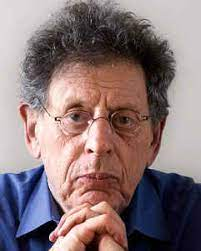


American composer and pianist, widely regarded as one of the most influential of the late 20th century. His work is associated with minimalism, being built up by repetitive phrases and shifting layers.
He grew up in Baltimore, US, where he was exposed to all music genres at his father's radio repair shop. His father would also often bring home recordings of modern music, asking his children to explain why they weren’t selling, so Glass was stimulated since his early years in exploring music. He then went on to study at the University of Chicago and the Juilliard School. Dissatisfied with the modern music of his time, he moved to Europe, to explore new music terrains, where he studied with the legendary pedagogues and musicians, especially the Indian composer Ravi Shankar who was a turning point for him. He returned to New York in 1967 and formed the "Philip Glass Ensemble"– seven musicians playing keyboards and a variety of woodwinds, amplified and fed through a mixer. He then created a new musical style which was called “minimalism”, although Glass himself never liked this term and preferred to speak of himself as a composer of “music with repetitive structures”. His music was experimental and unconventional for the 60's and 70's and came to have an increasing appeal to younger audiences through its repetitiveness, the use of amplified instruments and the tendency for a loud driving beat.
Through his operas, symphonies and collaborations with artists ranging from Woody Allen to David Bowie, Philip Glass has had a great impact upon the musical life of modern times. His operas - “Einstein on the Beach,” “Satyagraha,” “Akhnaten,” and “The Voyage,” among many others – are being played throughout the world’s leading concert places.
Film music was also a particular focus of Glass’s compositions By the early 21st century, he had produced scores for some four dozen films, notably the dramas "The Hours", "The Truman Show", "Notes on a Scandal", the documentaries "A Brief History of Time" and "The Fog of War: Eleven Lessons from the Life" of Robert S. McNamara.